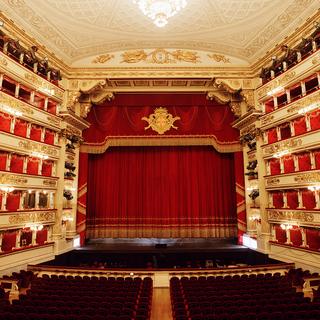


La Scala, the theater of Italy's passions
Long ReadDominique Meyer, the French director of Milan's opera, is due to step down in early March. He will be replaced by an Italian, as has been the case in many of the country's cultural institutions since Giorgia Meloni's far right came to power. In addition to being a national symbol, this temple of opera has always been a place of intrigue and scandal.
Every year on December 7, Milan celebrates its patron saint, Ambrose. In the morning, a mass is held in the basilica named after this 4th-century bishop, famed for his fiery hymns. The mayor then presents the Ambrogino d'oro, a medal awarded to outstanding figures of the Lombard capital. Ritual dictates that the celebrations come to a close at La Scala theater, where the opera season opens that same evening.
This year, before the inaugural show, VIPs fluttered around under the legendary house's chandeliers, including actor Pierfrancesco Favino. The Italian stars in Maria, Pablo Larraín's film about the soprano Maria Callas, to whom La Scala owes some of its splendor. "On December 7, I felt like I was taking part in a ritual," the actor later said. "In Italy, every town has a church and a theater. La Scala is the one where our history resonates the loudest."
Italian Senate President Ignazio La Russa took his seat under the royal box's gilded decor to attend the performance. The far-right politician was joined by senator-for-life Liliana Segre. At 94, this Nazi camp survivor no longer travels without a bodyguard after being the target of anti-Semitic attacks. In the absence of Italian Prime Minister Giorgia Meloni and President of the Republic Sergio Mattarella, who were in Paris for Notre-Dame's reopening, the Italian state was represented by a very unusual team. The cameras of the Italian public television network RAI didn't miss a single second of the event, which aired live on Channel 1. Thirty-seven massive screens and Christmas trees had been erected in prisons, schools and hospitals in Milan for the occasion.
You have 93.14% of this article left to read. The rest is for subscribers only.
